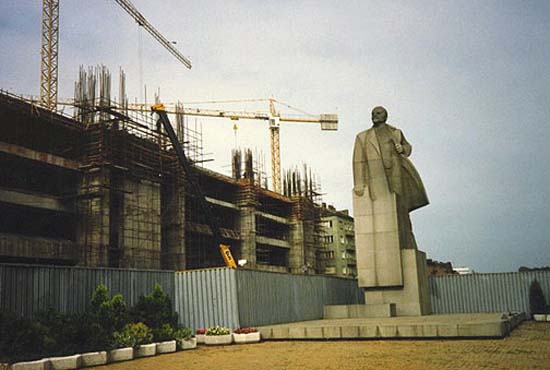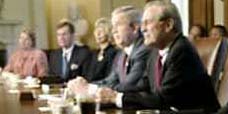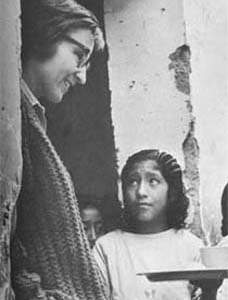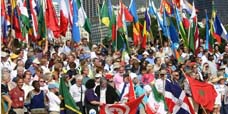
Bulgaria PCV Gregory M. Halstead says: It's time for Americans to be served with the truth from the media
Letters & Submissions
The Pendulum (Elon College)
February 9, 2005
To the Editor:
I'm wondering about the reaction of students to events a month ago after the tsunami disaster, and in particular, how their reaction might have been different from other world events. I wonder, too, if they have thought hard about the implications of what they heard/saw in the media about it.
I'm writing from a very different viewpoint of that particular crisis as I work in the first job I've held outside of my Elon education with the US Peace Corps in a Bulgarian town of 3,000 people. I am working in a program called Community and Organizational Development and have been placed in the town's only non-governmental organization, a small "business center." That's quite a contrast from US small-town, rural life where PTAs, 4H, scouts or some other organization works to help people help themselves, but there are many differences between Bulgaria and the United States. A big difference is that poverty is in such wide-open view: it is a part of daily life. For example, families of 10 live in one-room shacks in the worst neighborhood of this town and it is a regular sight to see signs of malnutrition, naked kids (even when it's 40 degrees Fahrenheit or colder) and the poorest eating others' refuse. The problems are complex and not easy to solve by any means.
From that perspective, then, it's hard to know how to react to news of a region, also suffering from such stark poverty, hit by a tsunami. It's awful. It is an injustice that so many people died and more are suffering. We had to act fast to help. We must spend money to develop early warning systems. Yet, this wasn't a man-made disaster, so what about things which are man-made and might be completely preventable?
Do students wonder why there is so much more media coverage about a natural disaster such as this tsunami than, say, the war last decade in Rwanda or the horrors in Dafur? Why does the media talk more about big events when they can be helped by scientific efforts (tsunami detection equipment is in the Pacific) but not when they can be helped by political and economic efforts. Certainly the war in Iraq is an exception and one that, by some estimates, has similar death-toll magnitude as the recent tsunami. Yet, what about situations like the famine in China about 40 years ago? How many Americans can remember that 30 million died in that series of famine? Maybe that's a bad example because it was a while back, but wouldn't it help keep our perspectives in balance to know more about all major world events?
Many crises aren't even situations dealing with political instability. Where's the coverage on the coffee crisis? Where's the coverage of the even bigger water crisis and its importance in all regions of the world from our own four corners and California to Palestine, Brazil and Cambodia?
It's time for Americans to be served with the truth from the media. IT'S TIME FOR AMERICANS TO BE GIVEN MEDIA THAT UNDERSTANDS ITS ROLE TO BE MORE LIKE A FORM OF CONTINUING EDUCATION THAN ENTERTAINMENT. Our country is hurting without widely popular forums for discussion of critical issues and I have no problem believing that it is largely the fault of our media's weak and unfocused leadership. To be fair, the media coverage was probably good for gaining humanitarian support that was/is vitally needed for the tsunami crisis. Yet, is the reason journalists don't cover political instability-related problems is because they feel they have to have the US Marines to accompany them? I'm sure the millions who died last decade in central Africa wished there had been better coverage. Maybe Americans would have been upset about that and enacted democratic systems in order to send some more troops. Is the reason they don't cover poverty-related problems because it's not as high profile to go to a ghetto? Aw, maybe they are uncomfortable. They should be, and so should all of us.
How do students feel about this? Shoot, people here wonder if we really have democracy in the United States. Can you believe that!? Maybe if we don't know what is happening in the world we don't! Act! Raise your voice! Demand better!
Gregory M. Halstead, Class of 2004










